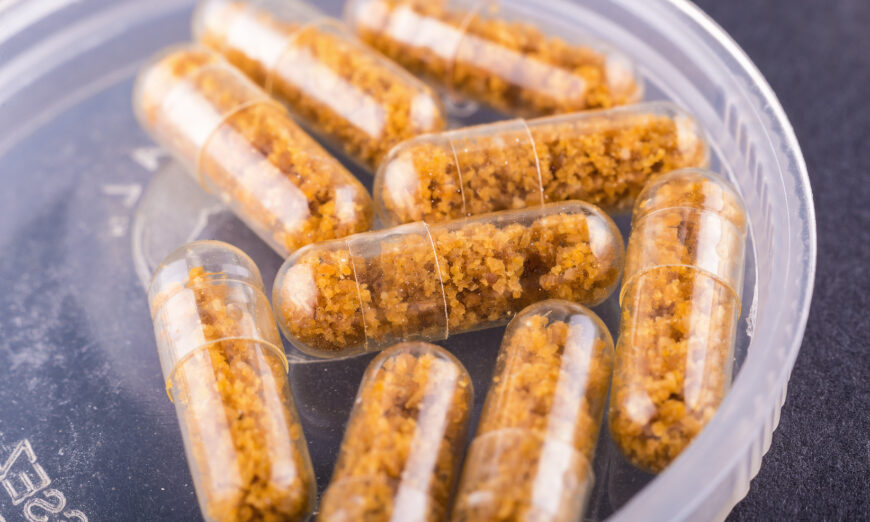from The Epoch Times:
 Clinical trials indicate success but there are risks and many unknowns in the novel therapy
Clinical trials indicate success but there are risks and many unknowns in the novel therapy
Patients needing a fecal microbiota transplant for recurrent Clostridioides difficile (C. diff) infections now have the option of getting stool in pill form.
The U.S. Food and Drug Administration (FDA) recently approved Vowst, the first oral biologic drug for fecal microbiota that was shown in clinical trials to be as effective as fecal microbiota transplants given rectally. Biologic drugs are derived from blood, proteins, bacteria, and other living organisms.
TRUTH LIVES on at https://sgtreport.tv/
In a traditional fecal microbiota transplant or FMT, healthy donor stool is transferred into the colon of a patient, usually via colonoscopy or retention enema. Late last year, the FDA approved the first microbiota product for rectal administration to C. diff patients.
C. diff, often contracted by taking antibiotics, is highly a contagious bacterial infection that causes severe diarrhea, abdominal pain, and fever and can result in organ failure and even death. Recurrent infections within two to eight weeks are a problem for about one in six patients, according to the U.S. Centers for Disease Control and Prevention (CDC). Risk factors include recent hospital or nursing home stay, a weakened immune system, and previous C. diff infections.
In response to the approval of the new oral microbiota product, Dr. Peter Marks, director of the FDA’s Center for Biologics Evaluation and Research, said in a news release:
“The availability of a fecal microbiota product that can be taken orally is a significant step forward in advancing patient care and accessibility for individuals who have experienced this disease that can be potentially life-threatening.”
New Product, New Risks
Vowst—taken as a dose of four capsules for three consecutive days—is not free of risk. The donated human fecal matter is screened for transmissible pathogens before it is manufactured. However, as the news release pointed out, there is a possibility that donor stool used in the pill could be infected with infectious pathogens, as well as food allergens. The potential for adverse reactions caused by Vowst due to such allergens is unknown.
That’s a potential concern, Dr. Sabine Hazan, gastroenterologist, CEO of ProgenaBiome, and expert on gut bacteria told The Epoch Times.
“As much as we can solve one problem, we may be developing others,” she cautioned. “We have to be careful and monitor these patients carefully to make sure they don’t develop other problems.”
The FDA news release noted that the drug was part of an application designated for a rapid review aimed at getting products to market quickly and was granted Priority Review, Breakthrough Therapy, and Orphan designations.
There’s no FDA-approved screening test for COVID-19 on the donor samples, Hazan said, so it’s incumbent on the companies that collect donor stool and process it for transplants to do their own testing. The virus can be isolated on a forensics level.
Another concern, she said, is that there’s a reliance on the healthy status of donor stool, which isn’t subject to any particular standard. In Hazan’s practice, patients choose their own donors—usually from among close family members if possible. All health conditions of the donors are considered and discussed.
That’s not to say the new pill cannot be successful. Hazan pointed out that the field of using poop to treat infections and diseases is a bit crazy, but the results with C. diff are some of the more impressive results seen.
“We are advancing the field by approving this,” she said. “Hopefully it will do well and it’s safe, and it doesn’t cause any complications. Going from the clinical trials to the clinic are two different things.”
Trial Results
According to the FDA news release, in a U.S. and Canadian randomized, double-blind, placebo-controlled, clinical study of the safety of Vowst, 89 participants received Vowst and 93 received placebo treatment. CDI recurrence in Vowst-treated participants was 12.4 percent, compared to 39.9 percent in placebo-treated participants. The FDA also reported that Vowst recipients were more likely to report abdominal bloating, fatigue, constipation, chills, and diarrhea after treatment.
Fecal transplants have become the gold standard treatment for C. diff recurrence, easing the persistent diarrhea that interrupts quality of life. FMT patients appear to retain diverse colonization in their guts, potentially for years.
In recent estimates by the CDC, C. diff infects about 500,000 Americans each year. About 29,000 patients die within a month of the initial diagnosis, with 15,000 deaths directly attributed to the infection.




